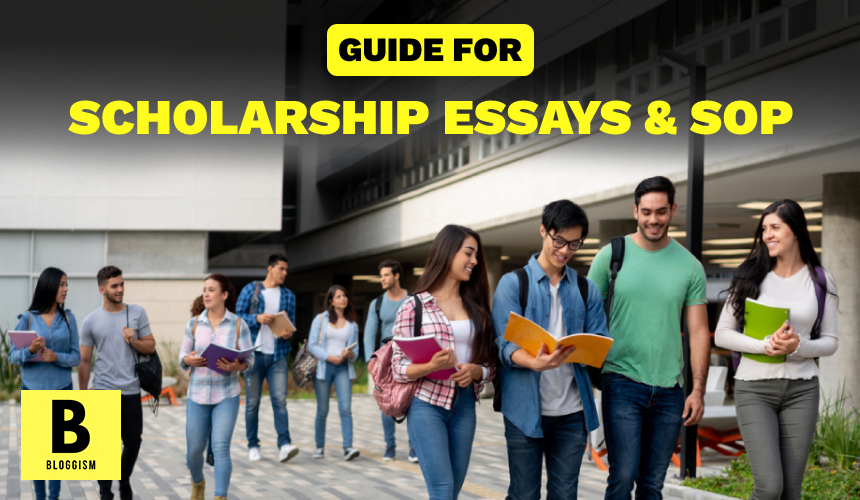
Admission season is around the corner, and most of your peers have already started applying for their dream colleges. If you haven’t begun the process and feel anxious about the upcoming deadlines, then this article is for you. It is a comprehensive guide for students all around to world to write top-notch scholarship essays and personal statements. The article will be divided into two sections that will consist of game-changing tips to write a scholarship essay and a personal statement.
Tips to Write a Scholarship Essay
1. Outline the Essay
Before you start writing the actual essay:
- Try to write a rough outline of the essay.
- Do your research and note down all the deadlines and requirements for the scholarship you wish to apply for.
- Spend sufficient time brainstorming and coming with ideas and creatives you want to include in the essay.
Additional tip- don’t forget to do your research on the scholarship committee. This doesn’t mean you have to compromise the integrity and quality of your essay to fit the category of their ideal candidate. Sometimes, it helps to know about the people who will read your essay and what they are looking for in a candidate.
2. Understand the question
To promptly address the issue asked about in the question, you will need to understand it first. Re-read the question and note down your thoughts about it. Understand the underlying themes, ideas to write an in-depth essay that will connect with your audience. It will show the committee that you have put in a significant amount of effort and time in writing the essay. For instance, the meaning of Global Warming refers to how this grave phenomenon personally affects your life and the measures you take to battle it.
3. Engaging Start and Satisfactory Conclusion
Remember how teachers in grade school always told us- The first impression is the last impression? Well, they are not wrong. You need to ensure your essay is off to a great start because it sets a pre-notion about the rest of your essay. Some helpful ways to write an engaging start is to include a quote, statement, or even a small relevant anecdote that reflects your thoughts and feelings in the rest of the essay.
Students should also make sure to conclude the essay appropriately. A separation conclusion paragraph that summarises your scholarship essay and personal injections will help finish the essay in the right tone.
4. Keywords and Synonyms
Keywords are an essential part of any written content. In content, marketers use keywords to boost SEO to emphasize the said topic. Identify the keywords from your scholarship statement and repeatedly use them throughout your writing to lay emphasis on the question being asked. This shows the committee how well you have understood the topic. They will be impressed with your commitment to addressing the issue relevantly. You can also use synonyms of the keywords to be less repetitive and more organic. It is also an excellent opportunity to show your vocabulary skills and proficiency in the language.
5. Ethos, pathos, and logos
You must be wondering what the subheading means. Well, ethos, pathos, and logos are modes of persuading a reader. This contemporary technique, when implemented thoroughly, shows tremendous results. Ethos refers to establishing your authority, credibility, and reliability on a subject. Generally, people use their own life experiences to establish ethos. Pathos refers to how you can use emotions, feelings, and thoughts to support your case. Logos refers to how you use rational thoughts, reasons, and logic to communicate your point. To write a perfect scholarship essay, you will need to use all three modes in your writing. It will make your work as authentic, persuasive, and honest as possible.
6. Use Imagery
English grammar has a plethora of grammatical tools that aid in making your essay distinctive. One of them is Imagery; it is a powerful tool heavily used in creative writing to enhance the reader’s experience. Similarly, it would help if you painted a picture of your actions and words in the reader’s mind to help them connect with your work. For instance, if you spent the summer building houses for the underprivileged in Haiti, then elaborate on that in your essay. Illustrate using examples like- it was an enriching learning experience for you and the different values, cultures you learned by interacting with the locals.
Scholarship Essay Sample
To help you get a better grip on the writing process below is a short example of how to write a top-level scholarship essay using the tips mentioned above.
Prompt- Discuss the impact of Global warming
“Global Warming isn’t a prediction. It is happening.” – James Hansen.
Most of us are aware of the seriousness of Global Warming and the irreparable damage it is causing to our planet. As citizens of Earth, we are doing little to replenish the resources we uncontrollably exploit. The constant efforts of scientists, environmental activists like the iconic Greta Thunberg have had little impact on the majority of the community. It is a constant cycle of playing the blame game between rich developed countries, capitalists, industrialists, and corrupt politicians, while nothing is essentially about the central issue.
Most people fail to realize how global warming is a well global problem and individualistic. It is a little too late for the “I didn’t break it, so I won’t fix it” mindset. Every human on the planet is part of the problem. I consciously reduce my waste generation by recycling and reusing my waste to decrease my carbon footprint. I was inspired by this ted talk where the speaker took upon an environmental challenge to fit her annual waste in just a single small jar.
I’m nowhere close to reaching my reduced carbon footprint goal, but I can proudly say that I have made significant progress. All in all, it was an eye-opening and insightful journey, and I will not stop spreading awareness about critical topics like Global warming, heightened pollution, mismanagement of toxic waste, and other similar topics. As individuals, we can be responsible for carrying out minor changes to save our planet.
Tips to Write a Personal Statement
1. Comprehend the requirements
Find out all the technical requirements before you attempt to write your personal statement. Information like word limit or a number of pages and editing settings are crucial data that serves as assessment criteria of your statement. If there is a prompt given, then try to completely comprehend the meaning behind it and then start writing. Moreover, details like word cap help you plan your statement. Depending upon the set word limit, you can accordingly decide the length of your statement.
2. Be Concise
I know the topic says the personal statement, but that doesn’t necessarily mean you have to add irrelevant details, stories, and incidents to the draft. The admission officer doesn’t want to know about your entire childhood, and neither do they have the time to read long paragraphs that add zero worth to your statement. Thus, ensure your writing is straight to the point, and your concise work contains all relevant information.
Organizing your thoughts before you start penning them down is generally a helpful way to stick to the topic. Clear your mind and focus only on vital thoughts, feelings, and emotions while writing the essay. Once you start, the rest will automatically flow.
3. Address Discrepancies
A personal statement is an excellent way to mold your impression in front of the admission authorities. It is an incredible opportunity to make your case about any gaps and discrepancies on your resume. Suppose you took a gap year after high school, and this might raise some questions in the minds of the admission officers. You can explain this in your statement by elaborating on why you took a gap year and what did you do with your time. For example, you can write about how you wanted to experience and learn about different cultures, so you spent one-year backpacking through Europe. You picked up on the local languages, and the travel helped you figure out what you want to do in the future.
4. Emphasize why they should choose you
There are probably a lot of other qualified candidates that have applied for your course. So what makes you different from them? What makes you unique? These are the types of questions admission officers will think about before reading your application. That’s why it’s crucial to answer them in your personal statement. Present yourself positively to help the readers know you and choose you. It is cardinal to remain authentic as the readers have years of experience reading personal statements, and they can quickly figure out if you are lying or making these things up.
5. Strengths and Weakness
Your aim is to sell yourself to the university in the two to three thousand words you write. Your work should be a testament to the optimistic, curious, and motivating indivisible you are. Emphasize your strengths but ensure you don’t boast as it may come off as narcissistic to the reader. Nonetheless, a wise person isn’t only aware of these strengths but weaknesses too. No one is a perfect human, and college isn’t demanding for one either. It is in our human nature to have weaknesses and make mistakes. What matters is you own them and continue working on them. Illustrate how you are continually working on becoming a better version of yourself. Growth and progression are positive indicators in a student, and it will definitely impress the admission officer.
6. Feedback and Proofread
Since you are writing about yourself, it is understandable if you get biased and go overboard on your statement. It is easy to get blindsided and partial because of our thoughts and emotions. Therefore, you need to ask for feedback from your friends, mentor, family members after you are done writing your statement. They can point out the mistakes and suggest changes to help you make the statement more honest and credible.
Proofreading is also a vitally important part of writing. Like mentioned earlier, we are bound to make mistakes, and thus it is critical that we proofread several times to correct our mistakes. A simple typo, missing punctuation mark, or a grammatical error exhibits the carelessness of the student. Thus, proofread several times to ensure that you avoid any silly mistakes.
Personal Statement Example
Below is an example of how to write an effective personal statement using the tips mentioned in this article.
Question: Why do you want to study at this university?
Growing up, my mother always spoke about the unforgettable memories she created while studying at this university and how one day I’ll grow up and experience something similar too. She would also take me to all alumni events or the university garden to drink coffee from her favorite coffee stand whenever she felt nostalgic. Since then, I have intentionally and unintentionally been very attached to and keen about this university. So in a way, it has been a dream of mine to attend this college. Moreover, the curriculum of my course is ideally designed to help me kick start my career after graduation. The placement cell and the top-ranked varsity cheer team are also part of the reason why I want to study at your esteemed university. As a former cheer captain, I’d like to continue my cheering and hopefully contribute to the team’s success in regional championships. This university has the perfect balance of academic and co-curricular activities for me.
To Sum up,
The application process can be excruciatingly tiring, daunting, and nerve-wracking. It is essential to remind yourself to take care of your mental, physical and emotional health during the process. Some universities will accept your admission while some may not, and that’s completely okay. Don’t be hard on yourself. Follow the above-mentioned tips for some guidance during the application procedure, and remember to be true to yourself while writing them.


